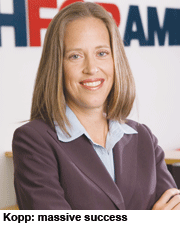TFA success story
In her final thesis year at Princeton University in 1989, Wendy Kopp conceptualised the Teach For America (TFA) model which essentially involved recruiting high-achieving university graduates to teach in low-income schools for at least two years — a stint she rightly believed would transform them into lifelong champions of school education. Starting with an initial batch of 500 graduates in 1990, Teach For America’s fellowship programme has grown to 10,000 today — a remarkable twenty-fold expansion — built on massive recruitment and fundraising success. Public institutions and private donors have committed huge sums — recently a $50 million (Rs.270 crore) pledge from the US department of education; $49.5 million (Rs.268 crore) from the Walton (Walmart) Family Foundation, $100 million (Rs.541 crore) from a group of four other major foundations and millions more from individual donors and corporations. In 2011, TFA declared net assets in excess of $350 million (Rs.1,895 crore).
 Similarly its teacher fellowship programme has fired the imagination of idealistic youth across America. Currently TFA is among the most popular post-college career choices in America’s elite Ivy League universities with over 10 percent of graduates applying for TFA fellowships since 2009. Other top suppliers of TFA fellows include University of California-Berkeley, Northwestern and Georgetown universities, which contributed 88, 63, and 61 graduate students respectively, to TFA in 2012. Meanwhile many of TFA’s 28,000 alumni have attained positions of influence and power in government and business. They include Michelle Rhee (former chancellor of schools in Washington DC and founder of the StudentsFirst advocacy group), educationists Mike Feinberg and Dave Levin (co-founders of the Knowledge is Power Program (KIPP) network of charter schools), and US state senators Mike Johnston and Bill Ferguson. Together they constitute a powerful lobby of like-minded education reformers who enjoy widespread media coverage, public approval, access to policymakers and bipartisan support within Republican and Democratic parties.
Similarly its teacher fellowship programme has fired the imagination of idealistic youth across America. Currently TFA is among the most popular post-college career choices in America’s elite Ivy League universities with over 10 percent of graduates applying for TFA fellowships since 2009. Other top suppliers of TFA fellows include University of California-Berkeley, Northwestern and Georgetown universities, which contributed 88, 63, and 61 graduate students respectively, to TFA in 2012. Meanwhile many of TFA’s 28,000 alumni have attained positions of influence and power in government and business. They include Michelle Rhee (former chancellor of schools in Washington DC and founder of the StudentsFirst advocacy group), educationists Mike Feinberg and Dave Levin (co-founders of the Knowledge is Power Program (KIPP) network of charter schools), and US state senators Mike Johnston and Bill Ferguson. Together they constitute a powerful lobby of like-minded education reformers who enjoy widespread media coverage, public approval, access to policymakers and bipartisan support within Republican and Democratic parties.
Nevertheless and perhaps inevitably, in recent years TFA has attracted some criticism with questions being raised about its impact (several studies show inconclusive results), short duration of its fellows’ training period (five weeks) and teaching commitment (two years), career commitment of alumni (less than half stay on beyond their two-year commitment creating vacuums in low-income schools), the NGO’s endorsement of quasi-independent government-funded charter schools and its tacit support to exam outcomes, teacher incentives and school assessment models combined with criticism that its methods undermine teachers unions. Critics say TFA’s tenor is self-serving, its fellowship programme inherently ineffective and its alumni movement ideologically aligned with radical, big business-backed reformers aiming to fully privatise US education.
Yet despite such often vocal criticism, TFA’s attraction within America’s high-achieving idealistic youth is undiminished. In 2012, it received a record 48,000 fellowship applications.














Add comment